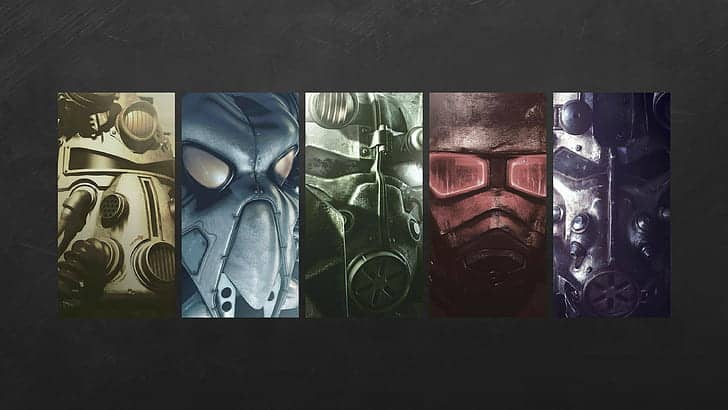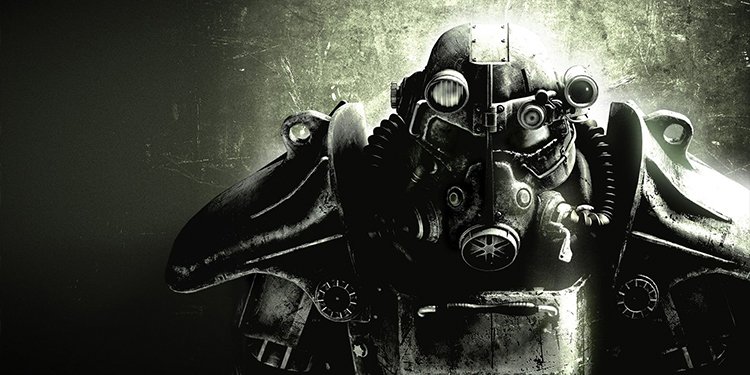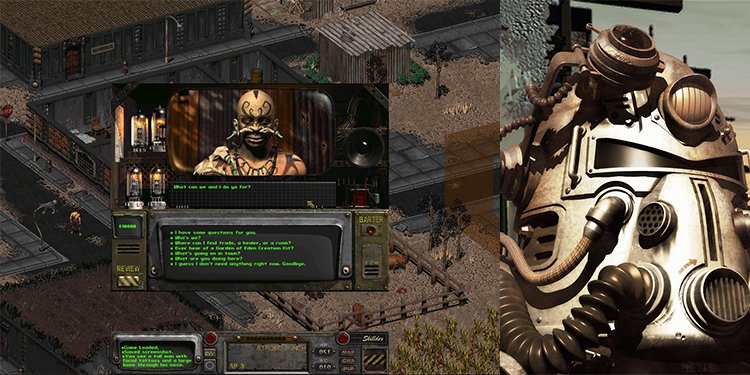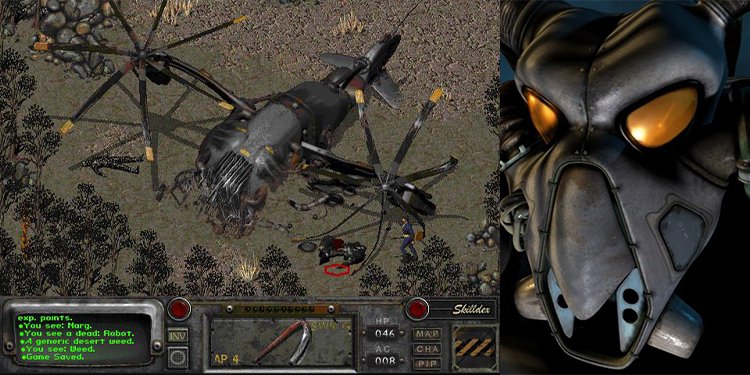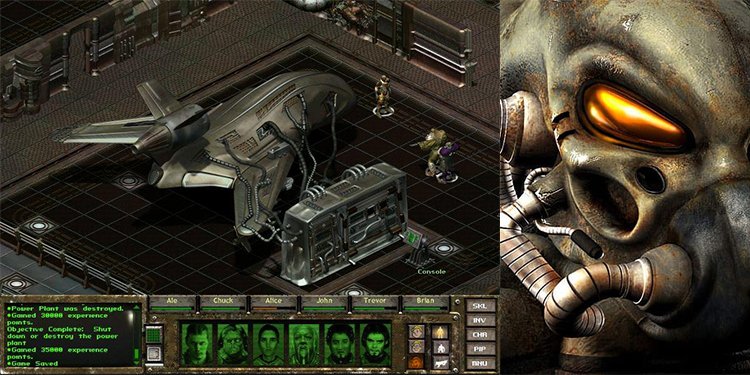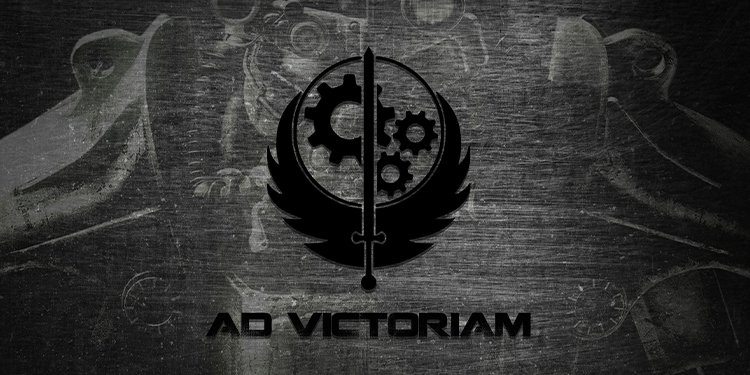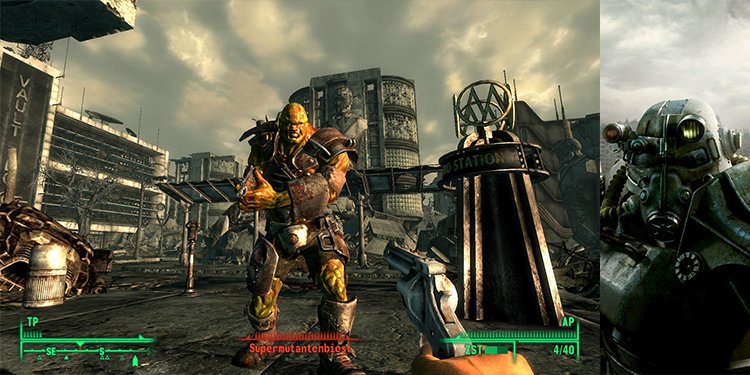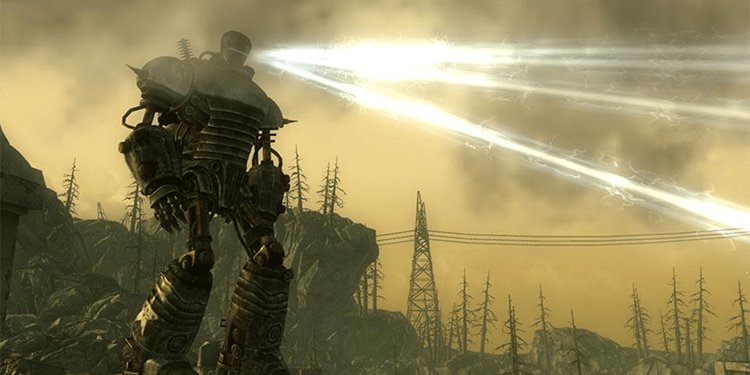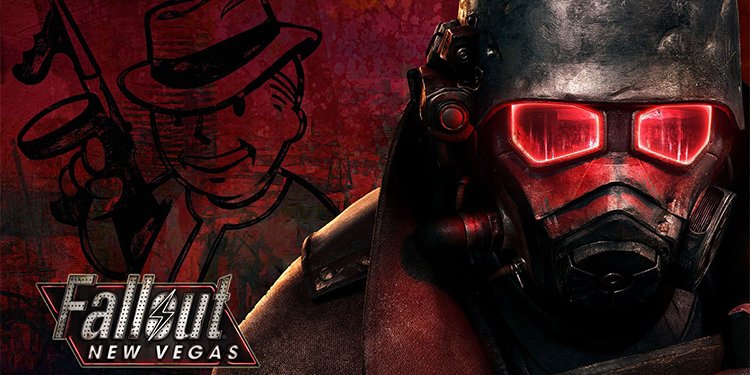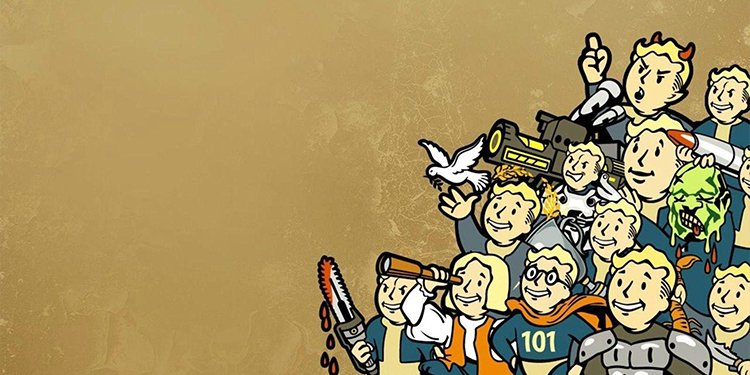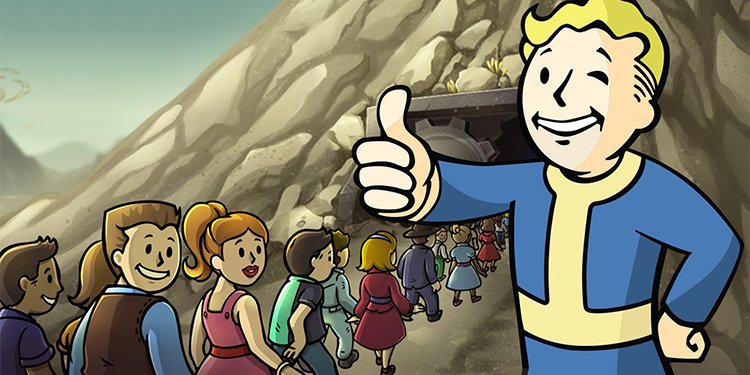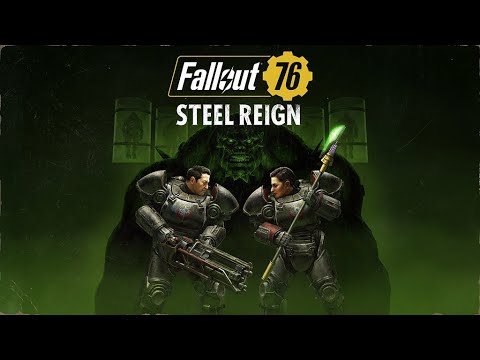Interplay Entertainment created the first two games. These were turn-based RPGs where most of the action happened through menus, choices, and dialogues. The follow-up games are action-shooter RPGs by Bethesda. Overall, there’re four main Fallout games, plus five spin-offs. On top of that, there’re several campaign expansions. The total is 25 Fallout entries. As for Interplay Entertainment, they moved on and created inXile. inXile created the Wasteland trilogy. These are turn-based isometric RPGs, considered as the spiritual successors of the original Fallout.
All Fallout Games in Order
The series presents itself with numbered entries, the main titles, plus various spin-offs. Either way, each game functions as a stand-alone adventure, taking the story far away in time and space from previous entries. Still, there’re elements across the entire franchise: Setting: After the Great War in 2077, the United States became a post-apocalyptic barren wasteland. Players explore the barrens on the 21st, 22nd, and 23rd Centuries, after the nuclear war. Art-style: The world before the war was a retro-punk ’50s inspired USA. The art-style inspired elements like the Pip-Boy, the music you can hear on radios, the robots, and similar. Vaults: Before the war, the company Vault-Tec created Vaults all over the United States. These are shelters originally designed to self-guard people from nuclear war. However, some of these were for human experimenting. Vault-Tec also created the Pip-Boy, the in-game computer/interface. Nuclear wastes: Radioactivity, nuclear wastes, and mutated animals are present in the wasteland. This introduces monsters like the Mirelurks. Through nuclear material, scientists also create the Super Mutants. Factions: Every game has various rivaling factions fighting for survival, resources, and their idea on how the post-war USA should be. One of these factions is The Brotherhood of Steel, zealots looking to seize all pre-war technology for themselves. Another faction is The Enclave, remnants of the United States government. Character progression: The Fallout series offers different character progression systems in each game. In essence, leveling up can raise your defenses, offenses, utility, and general survivability. SPECIAL: The character progressions work through the SPECIAL system -the stats. The acronym stands for Strength, Perception, Endurance, Charisma, Intelligence, Agility, and Luck. Character Creation: Similarly, Fallout games come with a character creation screen. It allows players to customize appearances, starting SPECIAL stats, and sometimes other perks. Each stat governs over distinct gameplay mechanics like melee damage, stealth, or HP. Skills, Traits, and Perks: Every Fallout game has skills, which the player unlocks as he level-ups. There’re also perks, innate bonuses you select via the character creation screen, or leveling. Lastly, some games have traits, a positive bonus that comes with negative feedback. RPG Mechanics: Most Fallout games feature heavy RPG mechanics. Role-playing in the wasteland means taking decisions that ultimately affect the different factions and the playable character. Sandbox Mechanics: Lastly, Fallout grants players vast freedom in their open-worlds. You can approach quests in multiple ways, choose your main quest path, and complete hundreds of side quests. Companions: Most Fallout games also have NPCs that may become your companions. Companions can react to your actions, choices, and dialogue to raise or lower their affinity. Moreover, they may ask you to do special missions for them that increase their loyalty. Multiple Endings: Every major Fallout game has various endings. Depending on player choice, you’ll see a vastly different end animation detailing the fate of the world and the factions.
Fallout 1 – 1997 (Main Series)
Interplay Productions released the original Fallout in 1997 for MS-DOS systems, Windows, and macOSX. The plot happens in the mid-22nd Century (the year 2161). The protagonist comes out of an underground shelter. He’s scouring the wasteland, searching for a piece that could fix the Vault’s faulty water supply system. The Vault Dweller hails from Vault 11, a Southern California shelter. Once outside the Vault, the player has freedom on where to go and how to complete the main quest. Players travel around the map, scour dungeons, visit places, and talk to local NPCs for information. Occasionally, the NPCs present dilemmas the player can solve to get Karma and XP. Fallout allows players to complete the entire game through charisma and diplomacy. But like any other game in the franchise, the player’s actions often dictate the story and the gameplay opportunities. Lastly, combat is turn-based and works through the action-point system. With each turn, players can perform multiple actions, and these actions cost action points. In particular, Agility raises the AP, as well as some specific perks. That said, there’re several weapons available in the game, which includes melee options.
Fallout 2 – 1998 (Main Series)
Fallout 2 debuted in 1998 for Windows and macOS. Black Isle Studios became the new developer, while Interplay Productions shifted into the publisher. The second installment features similar mechanics and graphics. Nothing big changed with only a year in between the two titles. However, it’s a new story with a new character. The year is 2241, 80 years after Fallout and 164 years after the Great War. The playable character is The Chosen One, the grandchild of the original Vault Dweller. His goal is to save his primitive and peaceful tribe from Arrollo, a stronger village on the USA West Coast. Led by the Vault Dweller, a group of Vault 13 survivors founded Arrollo. They used an environmental restoration machine – the Garden of Eden Creation Kit – to restore the site. However, the kit is ruining the tribe’s ancestral home. As before, The Chosen One has the freedom on how to complete the main mission. Time is ticking, though, as the Enclave has conquered his tribe. Lastly, the gameplay adds a few elements like prostitution, slavery, and crime.
Fallout Tactics: Brotherhood of Steel – 2001 (Spin-off)
Tactics: Brotherhood of Steel debuted in 001 for Windows. Micro Forté is the developer, and 14 Degrees East is the publisher. The plot follows the zealot faction in a war against another faction. However, it’s a non-canonical game, so the story is non-relevant. Gameplay-wise, it delivers turn-based combat, limited NPC interaction, and a linear progression. The first Fallout trilogy is available as the Fallout: Classic Collection.
Fallout: Brotherhood of Steel – 2004 (Spin-off)
Brotherhood of Steel debuted for Xbox and PlayStation 2 in 2004. It’s the last game in the series by Interplay Productions, and also the first for consoles. The game follows the adventures of a Brotherhood of Steel member. You choose among six characters, which includes the original Vault Dweller. Then, the gameplay changes the open-world sandbox for a linear experience. The game delivers one location at a time and 50 sites in total. Other than that, the gameplay mechanics are similar to the original games. The story follows three BoS initiates searching for a missing Paladin in the year 2224.
Fallout 3 – 2008 (Main Series)
Bethesda created the third main entry and released the title in 2008 for Windows, PS3, and Xbox 360. The game greatly changed the playability of the Fallout franchise. Instead of a top-down, turn-based game, Fallout 3 became an action RPG shooter. The major shift also included 3D graphics, real-time combat, and a bigger map. The plot happens in Washington D.C and its surroundings. The year is 2277, 200 years after the great war and 36 years after Fallout 2. That said, the third entry is not a direct sequel. In the true fashion of the Elder Scrolls creators, it’s a stand-alone story happening in the same universe. The new playable character hails from Vault 101. The Lone Wanderer ventures to the Capital Wastelñand to find his father, who mysteriously disappeared from the Vault. He finds out his father was working on a solution to clean the water from nuclear material. However, the Enclave are looking to plunder the technology for their own purposes. Fallout 3 is a shooter, and players can swap between the first person and third person. You grow in skills, stats, and arsenal as you play the game and meet the factions. Other than that, it retains the sandbox elements of games before. However, the choice mechanics and side stories are not as deep as they were in previous games. Lastly, the third entry introduces the VATS system. The Vault-Tec Assisted Targeting System is a slow-mo mode that allows you to fire at a target’s body parts while using your action points. It’s Bethesda’s way of retaining the classic gameplay elements in the new real-time scenario.
Operation Anchorage – 2009 (Fallout 3 Campaign DLC)
Operation Anchorage is a military simulation. You can relieve the liberation of Anchorage, where Alaska fought against the Chinese invaders. The content allows you to build and command interactive strike teams. There’re also new weapons, items, and the iconic Chinese Stealth Suit.
The Pitt- 2009 (Fallout 3 Campaign DLC)
The Pitt debuted in 2009 for Xbox, Windows PC, and PS3. It takes players to Pittsburgh to solve a conflict between The Enclave and a raider gang.
Point Lookout – 2009 (Fallout 3 Campaign DLC)
Point Lookout debuted for Xbox 360 and Windows in 2009. The campaign DLC introduces a new area, a swampland full of enemies and quests. The add-on was playable at any time during the storyline.
Broken Steel – 2009 (Fallout 3 Campaign DLC)
Broken Steel debuted in 2009 for Xbox 366, PS3, and Windows. Broken DLC also included Point Lookout, so PlayStation players had access to the previous DLC as well. The plot is about the Lone Wanderer becoming an ally of the Brotherhood of Steel. Both are looking to free the Capital Wasteland from The Enclave. As a post-campaign content, the Lone Wanderer can see the results of Project Purity, his father’s lifetime work. The DLC offers several missions, most of which are transporting clean water through the wasteland. Lastly, it presents new enemies, weapons, and endings.
Mothership Zeta – 2009 (Fallout 3 Campaign DLC)
Mothership Zeta takes players to an alien ship in orbit above Earth, in outer space. You meet new characters, grab new weapons, and make allies to escape the alien abduction. The last Fallout 3 DLC debuted in 2009 for Xbox 360, PS3, and Windows as well.
Fallout New Vegas – 2010 (Spin-off)
Obsidian’s New Vegas debuted in 2010 for Xbox 360, PS3, and Windows. Even though it’s a spin-off, it features the same gameplay as Fallout 3. It also shares some connections to the original titles. The spin-off offers depth in choice mechanics, side missions, storytelling, and consequences fans didn’t find in the third installment. For that reason, it’s known as perhaps the best Fallout title there is. The story happens in Nevada, in the year 2281. The protagonist is The Courier. He must find who betrayed him during his last gig of transporting a package across the Mojave Desert. The mission gets complicated when he discovers the package is a high-tech chip. Different factions in the New Vegas Strip are fighting over control of the Platinum Chip. Outside of the strip, two factions are in conflict for control of Nevada. These are the NCR, rangers trying to impose law and order. The other faction is Caesar’s Legion, a Roman-inspired tribe trying to conquer the land. The player may join either faction. Ultimately, your choices determine the owner of Nevadas’ most important resource, its water dam. Gameplay-wise, the game improved several mechanics compared to Fallout 3. For example, it added iron sights to weapons, enhanced the shooting experience, and made the character progression deeper.
Dead Money – 2010 (Fallout: New Vegas DLC Campaign)
The first post-launch pack debuted in 2010 for Xbox 360, PS3, and PC. It takes The Courier to the Sierra Madre Casino, where he must defeat Father Elijah across a toxic cloud. The pack adds several weapons, armor, perks, enemies, and choices.
Honest Hearts – 2011 (Fallout: New Vegas DLC Campaign)
Honest Hearts debuted in 2011 for PlayStation 3, Xbox 360, and PC. It takes players to a trading expedition in Utah’s Zion National Park. There, he gets in the middle of a tribal conflict between Caesar’s former allies. As before, the content adds new areas, perks, enemies, and gear.
Old World Blues – 2011 (Fallout: New Vegas DLC Campaign)
Old World Blues debuted in 2011 for Xbox 360, PS3, and Windows. It takes players to a secret research lab, the “Big Empty.” There, he can either defeat or join his kidnappers to beat a greater threat. The expansion introduces the most powerful weapons, armor, and perks available in the game. It also has a vast area to explore and an insane story to follow.
Lonesome Road – 2011 (Fallout: New Vegas DLC Campaign)
Lonesome Road debuted in 2011 for Xbox 360, Windows, and PS3. The content reveals one of the characters that betrayed the Courier. The protagonist travels to a new area to uncover the entire story and conclude the game’s story arc.
Fallout 4 – 2015 (Main Series)
Bethesda’s Fallout 4 debuted in 2015 for Windows, PS4, and Xbox One. The game changed the formula once again, as it added a construction mode and randomized loot. The story happens in Boston, and the surrounding area is known as “The Commonwealth.” The year is 2287, and you play as the Sole Survivor, emerging from a 100-year cryogenic stasis from Vault 111. The day you entered the vault, a raider abducted your child and murdered your wife. Once you wake up, you’re looking for revenge, as well as your son. However, you soon discover the mission needs to go deep into the mysterious “Institute,” a faction of androids looking to replace humanity as the better option for surviving in the wasteland. Fallout 4 is the first game in the series with a fully-voiced character. There’re also several factions, choices, consequences, weapons, weapon mods, and more perks than ever. In particular, each faction is struggling for control over the Commonwealth. In contrast, The Institute presents as the enemy of all mankind. Then, the construction mode works through getting resources in the wasteland. Every piece of trash you pick up is usable on one of the available hubs where you can build. Players can build shelters, crafting stations, food sources, water sources, and more. Lastly, Fallout 4 added the Survival difficulty mode. It forces users to manage immersive stats like hunger, thirst, sleep, limited carry weight, and diseases.
Fallout Shelter – 2015 (Spin-off)
Fallout Shelter debuted in 2015 for iOS and Android devices. It’s currently available for Windows, Xbox One, PS4, and Nintendo Switch. It’s free-to-play. The spin-off game is a vault-building simulator. You control and manage a Fallout Shelter, which means digging new levels and building different rooms. These rooms include power generation, clean water, food, arsenals, and similar. You then tell your dwellers where to work, what to do, and who to mate. Additionally, you can send dwellers to explore the land. You can’t control them. However, you can only tell them to come back. The longer they investigate, the more they can raise levels, find gear, and find resources. From time to time, these dwellers may find a location you can explore. You play these segments with 2D gameplay. Similarly, raiders and monsters can attack the vault, and you defend in 2D as well.
Automatron – 2016 (Fallout 4 Campaign DLC)
Automatron debuted in 2016. It introduces ADA, a self-aware robot looking to defeat The Mechanist, an evil robot creator. More importantly, the DLC introduces the Robot Workstation. It allows you to create and modify powerful robots and use them as companions.
Far Harbor – 2016 (Fallout 4 Campaign DLC)
Far Harbor is the second Fallout 4 expansion pack. It debuted in 2016 for Xbox One, PS4, and Windows.The content takes players to a new area. Following the quest of a detective agency, you explore a remote area in search of a young girl. However, you’ll find increasingly tough mutated monsters to defeat.
Vault-tec Workshop – 2016 (Fallout 4 Campaign DLC)
Vault-Tec Workshop debuted in 2016 for Xbox One, PS4, and Windows. The Sole Survivor helped Vault 88 survivors. Moreover, he can build a settlement within the Vault.
Nuka World – 2016 (Fallout 4 Campaign DLC)
The third expansion pack debuted in 2016 for Xbox One, PS4, and Windows. The setting is the eponymous amusement park, currently run by raider gangs. The plot is about defeating the raider gangs and their leaders to alter the power scale in the area. Gameplay-wise, it adds some new mechanics to the settlement construction mode.
Fallout 76 – 2018 (Spin-off)
Fallout 76 is an online Fallout game by Bethesda. It debuted in 2018 for Windows, PS4, and Xbox One. Originally, there were no NPCs in the world, so it hardly felt like a Fallout game. However, the post-launch DLCs have addressed the issue of adding NPCs and a cohesive story. You play as a new vault dweller on an online and persistent world. The plot revolves around finding the vault’s overseer and finding a cure against harmful diseases plaguing the land. It’s part of a larger story-arc about colonizing and restoring civilization. The plot happens in the year 2102 in Appalachia, a West Virginia location. Gameplay-wise, it’s very similar to the titles before. However, the title greatly improved shooting, stealth, crafting, and survival mechanics. Overall, Fallout 76 has greatly improved over the years. We consider it an okay casual MMO.
Wastelanders – 2020 (Fallout 76 Campaign DLC)
Wastelanders debuted in 2020 for Xbox One, PS4, and Windows. It introduced DLCs and a quest line about finding the Overseer of Vault 76. Moreover, there’re two new factions, Raiders and Settlers. These are in conflict for Appalachia.
Steel Dawn – 2020 (Fallout 76 Campaign DLC)
Steel Dawn is the second DLC, and it debuted in 2020 for Xbox One, PS4, and Windows. It introduces Elder Maxson, leader of the Brotherhood of Steel and a Fallout 4 character. The Brotherhood aims to establish a base in the region to protect the residents against mutated monsters. These monsters are the Scorch and the Scorched.
Steel Reign – 2021 (Fallout 76 Campaign DLC)
Steel Reign debuted in 2021 for PS4, PS5, Xbox One, Xbox Series, and Windows. It continues the story of the Brotherhood of Steel. This time around, the faction is fighting against Super Mutants and other threats related to The Enclave.
Every Fallout Game in Chronological Order
